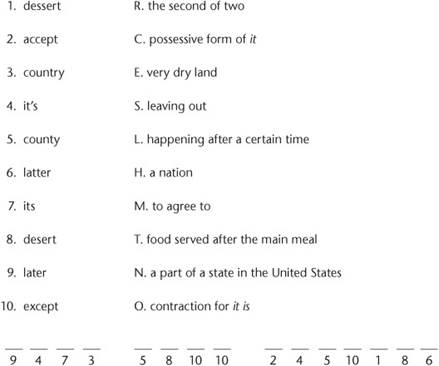Practice Makes Perfect: Exploring Grammar - Muschla Gary Robert 2010
Strange Creature
Confusing words
Usage and proofreading
Word usage is an important part of grammar. Words like accept and except, good and well, and lay and lie are easy to mix up. Even if you understand the meanings of these words, you may make mistakes with them if you are not careful. Because these words, and words like them, are easily confused, they may slip into your speaking and writing. You can avoid making usage mistakes by (1) understanding the meanings of easily confused words, and (2) proofreading your written work with care.
The tip sheets and worksheets that follow focus on word usage and proofreading. The first tip sheet identifies several of the most easily confused words, and Work-sheets 9.1 through 9.4 provide practice in recognizing and using these words correctly. The next tip sheet offers guidelines for proofreading for grammar mistakes, and Worksheets 9.5 through 9.14 focus on proofreading practice, which provides a general review of grammar.
Tip sheet
Confusing words
Some words in English are easily confused. They result in many mistakes for speakers and writers. The following list contains some of the most common of these words.
✵ accept—except
accept (verb)—to receive or to agree to
except (preposition)—not including; leaving out; but
✵ all ready—already
all ready (adjective)—completely prepared
already (adverb)—by this time
✵ breath—breathe
breath (noun)—air inhaled and exhaled
breathe (verb)—to inhale and exhale air
✵ council—counsel
council (noun)—an official group
counsel (verb)—to offer advice
counsel (noun)—advice
✵ country—county
country (noun)—a nation
county (noun)—a part of a state in the United States
✵ dairy—diary
dairy (noun)—a place where milk is produced or stored
diary (noun)—a personal journal
✵ desert—dessert
desert (noun)—very dry land
dessert (noun)—food served at the end of a meal
✵ its—it’s
its (pronoun)—possessive form of it
it’s (contraction)—it is
✵ later—latter
later (adverb)—after a certain time
latter (adjective)—the second of two
✵ lay—lie
lay (verb)—to set or place something down
lie (verb)—to recline or to rest
✵ loose—lose
loose (adjective)—not tight
lose (verb)—misplace; not win
✵ picture—pitcher
picture (noun)—a drawing or photograph
pitcher (noun)—a container for holding a liquid; a baseball player
✵ quiet—quit—quite
quiet (adjective)—little or no noise
quit (verb)—to stop
quite (adverb)—very
✵ their—there—they’re
their (pronoun)—possessive case of they
there (adverb)—in, at, or near a particular place
they’re (contraction)—they are
✵ threw—through
threw (verb)—past tense of throw, meaning to toss through the air
through (preposition)—going into one side and out the other
✵ whose—who’s
whose (pronoun)—possessive case of who
who’s (contraction)—who is
✵ your—you’re
your (pronoun)—possessive case of you
you’re (contraction)—you are
9.1 Strange Creature
Reports of a strange creature in a lake in Scotland go back nearly two thousand years. What is the name of this creature?
To answer the question, match each word on the left with its definition on the right. Write the letter of each answer in the space above its number at the bottom of the page.
